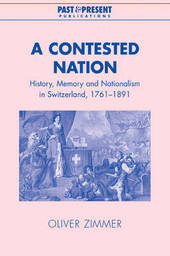
|
A Contested Nation: History, Memory and Nationalism in Switzerland, 1761-1891
Paperback / softback
Main Details
| Title |
A Contested Nation: History, Memory and Nationalism in Switzerland, 1761-1891
|
| Authors and Contributors |
By (author) Oliver Zimmer
|
| Series | Past and Present Publications |
|---|
| Physical Properties |
| Format:Paperback / softback | | Pages:292 | | Dimensions(mm): Height 228,Width 152 |
|
| Category/Genre | World history - c 1750 to c 1900
Political economy |
|---|
| ISBN/Barcode |
9780521039802
|
| Classifications | Dewey:320.540949409034 |
|---|
| Audience | | Professional & Vocational | |
|---|
| Illustrations |
2 Tables, unspecified; 10 Halftones, unspecified
|
|
Publishing Details |
| Publisher |
Cambridge University Press
|
| Imprint |
Cambridge University Press
|
| Publication Date |
16 August 2007 |
| Publication Country |
United Kingdom
|
Description
This book examines the ways in which the Swiss defined their national identity in the long nineteenth century, in the face of a changing domestic and international background. Its narrative begins in 1761, when the first Swiss patriotic society of national significance was founded, and ends in 1891, when the Swiss celebrated their 600-year existence as a nation in a monumental national festival. While conceding that the creation of a nation-state in 1848 marked a watershed in the history of Swiss nation-formation, the author does not focus one-sidedly - as many others have done - on the activities of the nationalizing state. Instead, he attributes a key role to the competitive and contentious struggles over the shaping of public institutions and over the symbolic representation of the nation. These struggles, to which the nation-state and civil society contributed in equal measure, were framed increasingly along national lines.
Author Biography
Oliver Zimmer was educated at the University of Zurich (Lic. Phil. I) and at the London School of Economics and Political Science (Ph.D.), and he began his academic career at the University of Durham in 1999. In 2005 he took up a University Lectureship (CUF) at Oxford. Previous publications include Nationalism in Europe, 1890-1940 (Macmillan, 2003) and Power and the Nation in European History (edited with Len Scales, Cambridge University Press, 2005).
Reviews'There are many strengths here, alongside the relative uniqueness of the subject. Zimmer's work is soundly based on historical, political and sociological theories of nation development. ... This is supplemented by extensive work in Swiss archives and historiography. And all is set in a helpful comparative perspective ... Zimmer makes [a] ... real contribution to our understanding of Swiss identity, then and now.' English Historical Review '... a very illuminating assessment not only of Swiss nationalism, but also of theoretical questions arising from the recent literature on nation formation. Zimmer's thorough reading across the theoretical canon makes A Contested Nation a highly relevant text not just for scholars interested in Switzerland, but for anybody working within the broader domains of nation formation.' H-Net: Humanities and Social Sciences Online 'A Contested Nation brilliantly illustrates the often-messy process of nationalization ... [The book] is both accessible to advanced undergraduates and vital reading for established scholars. It is a detailed, readable, and balanced addition to the nationalism literature.' The Nationalism Project 'A Contested Nation is an impressive book.' Jonathan Steinberg University of Pennsylvania, Nations and Nationalism 'Zimmer enters into the tangled discussions of nationalism and nation-building with confidence and flair ... His book represents a model of close historical research into the political and social conflicts of a state, linked to careful linguistic analysis of participants' statements. It is a model that future scholars of nationalism would do well to emulate.' Celia Applegate, Journal of Interdisciplinary History 'This book is a major contribution to scholarship on nineteenth-century European nationalism. It challenges simplistic approaches and instead asks the reader to pay close attention to the interplay and overlap of various national discourses.' Thomas Kiihne, Social History
|